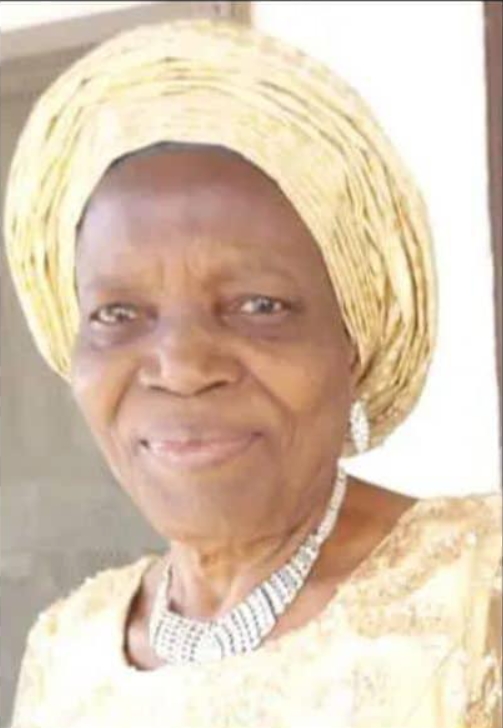Maritime Agencies
AMES 2024: OGBEIFUN Regrets Nigeria’s Indifference To Global Shipping, Urges A Reawakening.
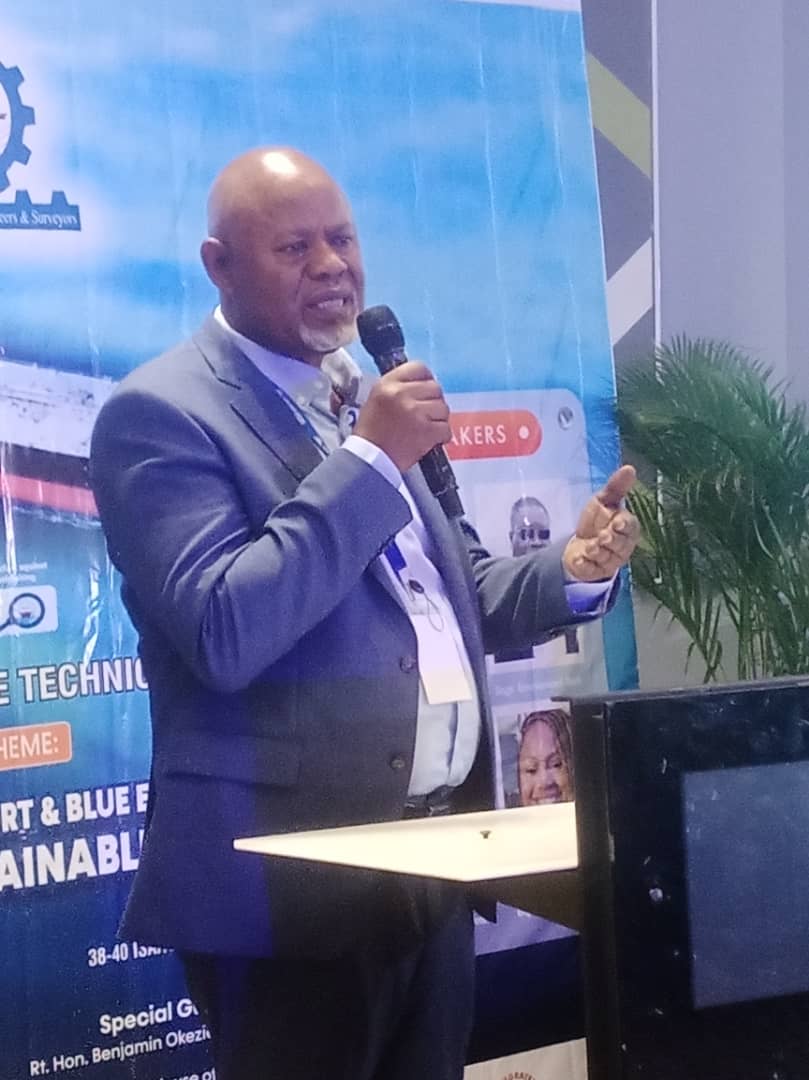
By Izuchukwu Ozoemena
Engr Greg Ogbeifun, a towering figure in Nigeria’s shipping industry, has taken time off retirement to tell truth to power regarding what the Federal Government must do to reap the huge gains embedded in the marine and blue economy now a new ministry is in place in order not to keep incurring losses which he conservatively valued at over $9.2 billion annually.
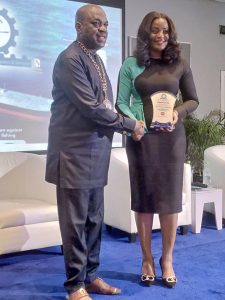
AMES President, Engr Israel Obadan, presenting an award to Iroghama Ogbeifun, CEO, Starzs Investment Co Ltd.
Presenting the lead paper entitled ‘Overcoming Challenges Against Re-emergence Of Global Shipping Lines: A Nigerian Perspective’ at the 16th Technical Summit of the Association of Marine Engineers and Surveyors (AMES), Thursday, Engr Ogbeifun pointedly told the massive assemblage of marine engineers and other maritime professionals that over 90% of them were already aware of the issues inhibiting Nigeria’s participation in global shipping which, for whatever reasons, the authorities decided to neglect for too long.
Engr Ogbeifun who recalled that since NIMAREX Expo in 2011, he had been consistently agitating for the creation of a separate ministry for the maritime sector, congratulated President Tinubu for achieving this in 2023. But as it is today, he cautioned, can Nigeria be talking about a marine and blue economy ministry when her waters remain largely brackish?
Ogbeifun, the Chairman of Starzs Investment Company Ltd and pioneer President of the Shipowners Association of Nigeria (SOAN) said Nigeria generates about 70% of the total cargo traffic within the West and Central African region.
“However, despite its geographical advantages and these huge opportunities”, he regretted, “Nigeria has failed to participate in the carriage of these abundant cargoes due to the lack of any Nigerian shipping line. This means that the country relies heavily on foreign vessels for the shipment of its inbound and outbound cargoes, leading to significant economic loss and negative security implications.”
He referred to the African Continental Free Trade Area (AfCFTA) regime, describing it as a major opportunity Nigeria has to wake up from her slumber and participate in continental shipping which can lead to increased foreign direct investment and a 7% upsurge in national income from what obtains now up to 2043. But where are the indigenous shipping lines? He attributed the collapse of the Nigerian National Shipping Line (NNSL) in 1995 to corruption in high and low quarters, mismanagement and abuse by government officials, budget misappropriation and other man-made factors.
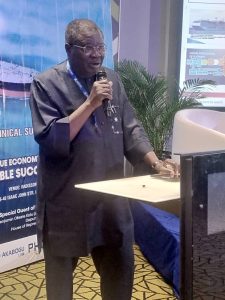
Rev Engr Emmanuel Ilori
“The demise of NNSL means Nigeria has since then lost all of the benefits of owning a global fleet and participating in the carriage of its cargo”, he pointed out.
The result, he declared, include loss of jobs, loss of freight earnings, loss of national tonnage capacity, distorted balance of trade, and a poor reputation in the comity of maritime nations.
With one vessel, ‘MV Abuja’, Nigeria, in 1996, commenced operations under the banner of the National Unity Line (NUL), flying Nigeria’s national flag and relaunching her into international reckoning. But by 2005, the NUL went the way of its predecessor, the NNSL.
Engr Ogbeifun recalled with great nostalgia that it breaks his heart each time he looks at the ports, all the quays and jetties are filled up with ships. But how many of them are owned by Nigerians?
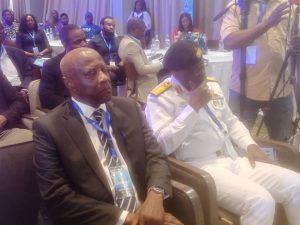
Capt Emmanuel Iheanacho and Rear Admiral Baratuaipri Iyalla
“The likes of Captain Emmanuel Ihenacho, Chief Isaac Jolapamo, and Temisan Omatseye, who bought ships in the past, the system killed their businesses. With the jobs they were providing and the economic benefits to the nation, everything went down.
“There are challenges that have made it very impossible for this country, since the demise of the Nigerian National Shipping Line in 1995, to own ships.
“Nigeria has a growing demand for shipping services, but the government has not made it possible for indigenous operators to own ships. The result of this has made Nigeria completely rely heavily on foreign ships to move her goods.
“Conservatively, Nigeria is losing about $9.2bn to foreign vessels dominance of her trade. We are the ones paying that money to the foreign vessel owners. Every Nigerian who imports or exports is paying hugely.
“I don’t think our leaders need a prophet to tell them that they need to be in a hurry to ensure Nigerians participate in her shipping freight.
“The enabling policies need to be implemented. How can Nigerians compete with foreign vessel owners who enjoy zero duty and a near-zero tax regime? It is high time our leaders provided policies that encourage indigenous shipping in this country.”
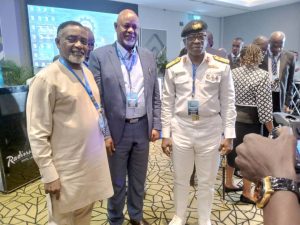
Regarding the beleaguered Cabotage Vessel Financing Fund (CVFF), Engr Ogbeifun asked ship owners to close ranks and form a formidable voice and begin to engage the authorities at least for the sake of the younger generation. He regretted that ship owners are crying while the waterfronts have now been converted into a mortuary for ships. Government, he insisted, must carry out reasonable fiscal policy reviews to empower Nigerian ship owners to be able to compete with their foreign counterparts.

He strongly advocated for the establishment of a Nigerian Maritime Bank, Nigerian fleet (not necessarily a national fleet).
“Let’s see a practical approach towards actualizing the exploitation of the marine and blue economy. The Marine and Blue Economy ministry has been established. Let the private sector drive the activities.”
Maritime Agencies
WAR AGAINST KILLER DRUGS: Apapa Customs, NDLEA Collaborate To Nab Huge Quantity of ‘Canadian Loud’.
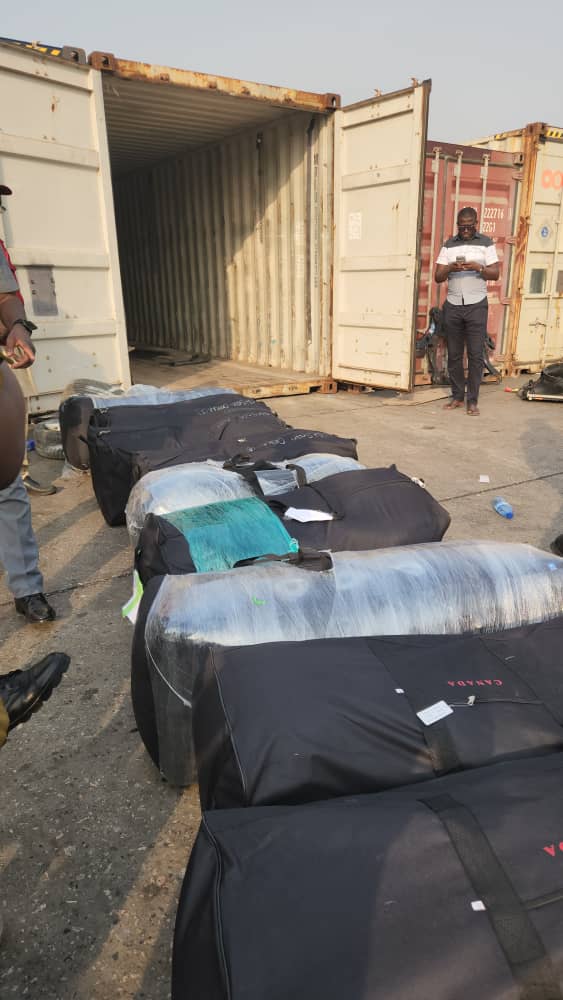
By Izuchukwu Ozoemena
In her unwavering efforts to ensure that killer – drugs do not find entry into Nigeria, the Apapa Command of the Nigeria Customs Service has, in liaison with the National Drug Law Enforcement Agency (NDLEA), intercepted a 347.5 kilograms of ‘Canadian Loud’ concealed in an imported Toyota Sienna car. The highly – valued substance is a potent strain of cannabis, ordinarily known as marijuana.
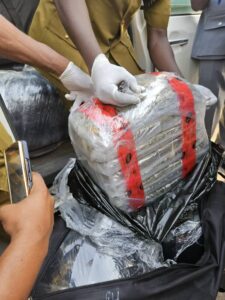
As stated in a press release by CSC Isah Suleiman, the Apapa Customs Command Public Relations Officer, the contraband hidden in 13 bags within one of four vehicles contained in a single consignment was discovered following a painstaking weighing exercise. A breakdown shows ten bags at 25kg each, one at 29kg, and two at 34.5kg and 34kg respectively, totaling 347.5kg.
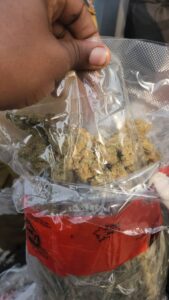
This interception marks the fourth major joint drug bust by the Nigeria Customs, Apapa Command and the NDLEA in less than two months.
In his remarks, the Apapa Customs Area Controller, Comptroller Emmanuel Oshoba re-enacted his warning to criminal elements and their networks to keep off the Command as the Command is always ahead of them to exploit whatever antics they deploy to undermine national security via the ports.
“Any attempt by criminal elements to traffic prohibited items through Apapa Port will be detected and thwarted. We remain vigilant and resolute in the discharge of our duty to protect our society and national security.”
He emphasized that under his watch, no cargo, whether import or export will pass through Apapa Port without thorough examination.
The operation also reflects the exemplary cooperation between Customs and NDLEA, championed by the Comptroller General of Customs, Bashir Adewale Adeniyi MFR, PhD. Intelligence sharing and joint tactical efforts have consistently outmaneuvered smuggling networks in Nigeria’s maritime sector.
Oshoba credited this strengthened partnership for the success, noting that the upcoming deployment of a high-capacity drive-through scanner capable of processing 200 containers per hour will further revolutionize anti-smuggling operations.
Both agencies continue to operate under strict Standard Operating Procedures (SOPs) that foster zero tolerance, professionalism, and seamless cooperation. In line with established protocols, the seized cannabis has been formally handed over to the NDLEA for further investigation and prosecution of suspects linked to the consignment.
This latest success builds on the recognition accorded to Comptroller Oshoba and NDLEA Apapa Special Area Commander Mohammed Tukur, who were both awarded the WCO Certificate of Merit on January 26, 2026, in Abuja during the International Customs Day celebrations.
Oshoba further explained that the interception aligns with the 2026 ICD theme: “Customs Protecting Society Through Vigilance and Commitment.”
While Customs remains committed to facilitating legitimate trade, the CAC reaffirmed, it will intensify efforts to disrupt illicit activities and safeguard society.
Maritime Agencies
Seme Customs Raids Hideouts, Impounds 200 Bags of Smuggled Rice, Collects N2bn 3 Weeks into 2026.
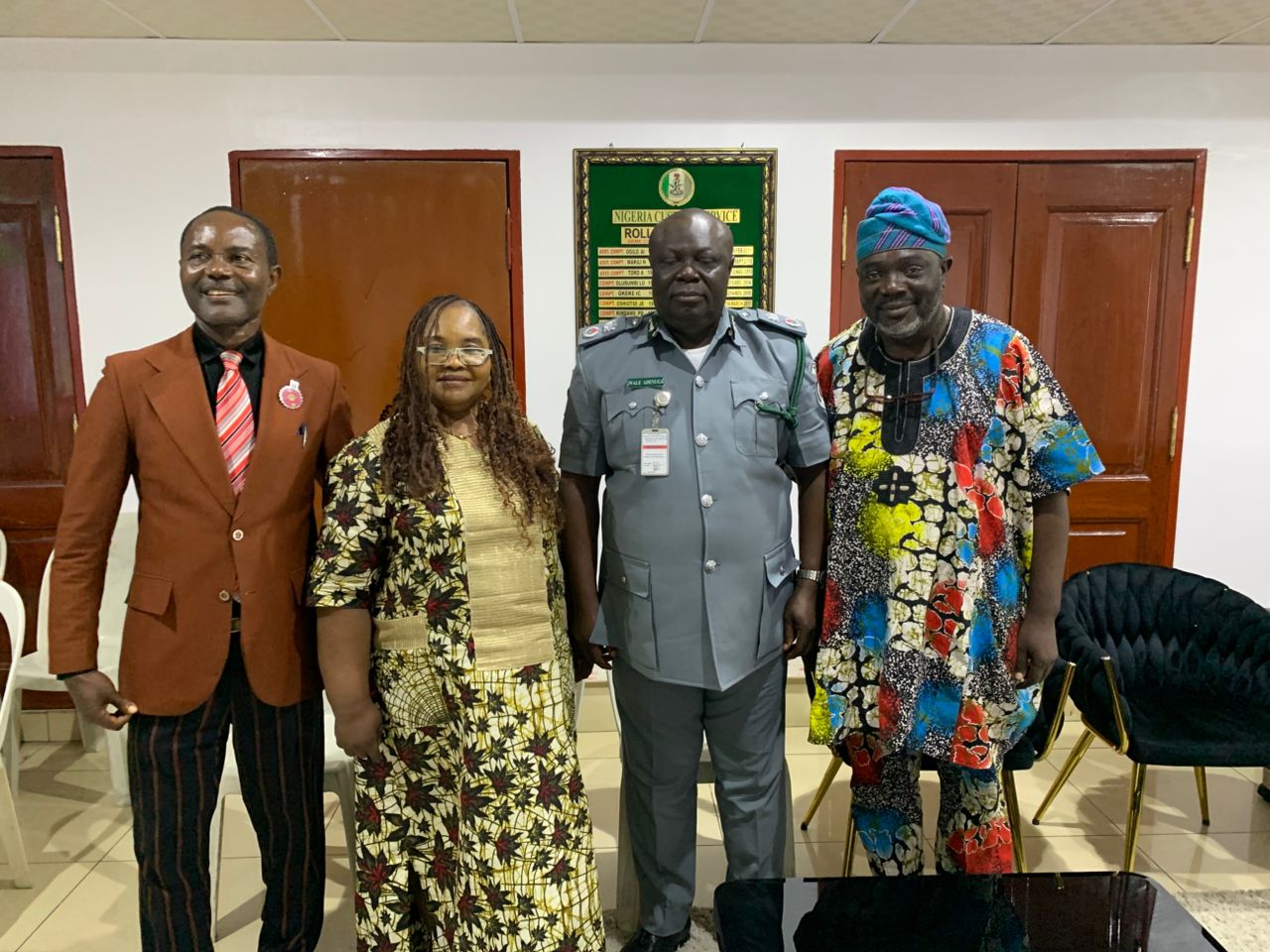
By Izuchukwu Ozoemena
The Customs Area Controller (CAC), Seme Border Command of the Nigeria Customs Service, Comptroller Adewale Adenuga has vowed a continuous raid of the Badagry Roundabout and other notorious points where miscreants assemble and sell smuggled rice.
Just as the Command is taking the fight to smugglers in their routes inside the bush, he explained, it has equally sustained surveillance on other identified distribution points of the smuggled goods in market places.
Consequent upon this, Adenuga disclosed that the anti- smuggling officers of the command raided the selling point of smuggled rice at the Badagry market on January 21st, 2026 where they impounded over 200 bags of smuggled rice.
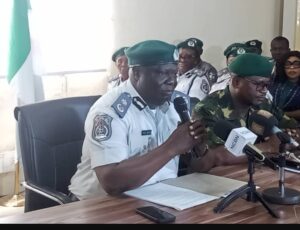
The CAC disclosed this at Seme Command, Wednesday, while exchanging views with the Tunde Ayodele-led Executive members of the Caretaker Committee of the Maritime Reporters Association of Nigeria (MARAN) who were on a courtesy visit.
” We have just raided the Badagry Roundabout where these smuggled rice are being assembled and sold.
” We had on several occasions warned them to desist from this act and leave the place.
”We have even asked the Oba of Badagry on my last visit to his palace before his death to appeal to these people to vacate the point of sale of the smuggled rice”
” They will smuggle the rice through the creeks and then will now come to that place and be selling.
”So if you go there now, you’ll see that it has been cleared” Comptroller Adenuga explained.
On revenue generation, he announced that few weeks into 2026, the Seme Command has maintained the high momentum of generation it had in 2025 as it has collected about 2 billion in the first three weeks of the new year. His men and officers, he maintained, are fired up to surpass the revenue figures recorded last year.
It is recalled that Seme Command recorded the sum of N15.6 billion in 2025 with N3.6billion of the total revenue collected in the month of December.
He maintained that with the continuous support of the Comptroller – General, Wale Adeniyi and his management team, Seme border will continue to sustain the momentum that propelled the officers into 2026.
While pledging to cooperate with MARAN on mutually -beneficial programmes Adenuga promised that Seme Command would maintain a steady course on revenue generation and will never ease the step on the anti- smuggling pedal in the new year.
Earlier in his address, MARAN Caretaker Committee Chairman, Mr Tunde Ayodele, congratulated the Controller on his assumption of duties as the head of Seme command, a feat he said was a testament to his rising profile as a committed customs officer and a reflection of the confidence of the management of the NCS in his managerial acumen to head the busiest border command of the Customs.
Ayodele assured Comptroller Adenuga of the support and collaboration of MARAN to ensure that he succeeds in his assignment.
The MARAN Caretaker Chairman noted that the association has noted with keen interest the vibrancy and transformation in the border operations at Seme which Comptroller Adenuga has brought within the short time he assumed duties.
”We are not surprised at the level of transformation and burst of activities you brought to Seme border operations, given your performance trajectory from your previous duty posts, especially at the Apapa Command where you were the unseen hands in the unprecedented revenue generation witnessed at the Customs’ flagship command when you were DC revenue” the MARAN chief recalled.
Meanwhile, the Comptroller- General of NCS, Adewale Adeniyi, has paid a condolence visit to the palace of Oba of Badagry through Comptroller Wale Adenuga.
According to Adenuga, he went to the palace of the late King on January 21st, 2026 on behalf of CGC Adeniyi to commiserate with the people and chiefs of Badagry Kingdom on the death of their first class monarch.
Customs
Lekki Deepsea Port: The Success Story of the Nigerian Ports Authority.
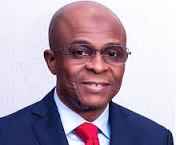
By Izuchukwu Ozoemena
The $1.5 billion Lekki Deepsea Port which commenced operations in April 2023 with a capacity to process about 1.2 million cargoes annually continues to receive commendation for various operational milestones it has achieved within so short a time. Parading the draught of 16.5 metres, the deepest of ports under the superintendence of the Nigerian Ports Authority (NPA), it sits on a 19- hectare land area.
So far, the Lekki Deepsea Port has successfully transhipped over 62,000 twenty foot equivalent units (TEUs) to various West African countries; its smart port model is unique in Nigeria while the short turnaround time for vessels stands at just 2 days. The physical layout of the Port has a 2 kilometres breakwater ridge which calms the waves from the harbour with a 9.6 kilometre channel providing the way for the 4 tug boats used by the Port to bring in the large vessels that drop cargoes.
The Port has a 680m quay length, with a breakwater of 2km for the Phase 1 operations. Upon expansion to Phase 2, the quayway will be extended to 1,500m, and the depth will become minus 19.5meters in the near future.
The Port’s development was made possible through a 45-year Build, Own, Operate and Transfer (BOOT) model from the NPA.
The scanners only need about 33 seconds to scan a container as soon as the 5 gantry (ship to shore cranes) have done the usual evacuation. The stacking method follows the 7 wide , 6 heights system. Moving à container from ship to shore takes a maximum of 3 minutes and presently, about 20% of the cargoes are evacuated through barges. The Port’s integrated automated operations makes business easier for port users.
From January to August 2025, the port recorded 88,432 TEU imports, 123,013 TEU exports, 62,581 TEU transshipment moves, 16,925 TEU restows, and 34,710 TEU barge movements with a projection to handle over 500,000 TEUs by end of 2025. Transshipment already represents 38 per cent of total activity, signalling the port’s growing hub status.
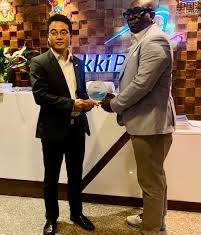
Mr Emmanuel Anda, the Lekki Port Manager, has been commended for contributing to improve operational services at the port . This has seen the Port engage in various innovative operational methods involving the transshipment of cargoes. The Port has evolved into a strategic maritime gateway, reshaping the logistics landscape of West Africa and opening new corridors for trade and industrial ambition across the continent.
The port facility includes three container berths, three liquid bulk berths and one dry bulk berth. The dry bulk and liquid terminal operations are in view. The Port is presently operating at about 50% of its designed capacity. Barge operations currently account for 20% of cargo movement, but rail connectivity is essential for long-term efficiency, particularly with the Lekki Free Zone’s industrial activities.
Lekki Port’s technological design integrates automated gates, OCR systems, ship-to-shore cranes, rubber- tyred gantry cranes, FS 6000 drive-through scanners, truck parks, and advanced control systems.
Its berth productivity averages 18 to 20 moves per hour, with truck turnaround time at approximately 45 minutes and container dwell time at 12 to 13 days. The Port is currently Nigeria’s second-largest terminal.
In agreement with the NPA, Mr Emmanuel Anda, Lekki Deepsea Port’s Manager, admits that the transformational impact has recalibrated West Africa’s maritime geography.
“For the first time, Nigeria is handling ultra-large vessels efficiently; Lekki is deepening Nigeria’s presence on global shipping routes and strengthening our maritime competitiveness. He said that the port was significantly boosting export activity, helping Nigeria approach a healthier balance of trade.
”The continued progression could see Lekki become a global export hub within 10 to 15 years”. Mr. Anda added.
Road infrastructure upgrades are ongoing, and the planned Lagos Green Line rail connection will significantly boost cargo evacuation and accessibility.
In the wider West African theatre, where the African Continental Free Trade Area (AfCFTA) is opening unprecedented opportunities, Lekki Deep Sea Port offers something rare: scale, speed and unmatched efficiency.
Amid capacity constraints in neighbouring countries and rising demand for deep-water logistics, Lekki gives Africa a competitive edge. On an ordinary day, containers rise like a new skyline, cranes swing rhythmically over the quayside, and massive ships glide into position. Beneath the mechanical precision is something more profound: a new economic centre is being born on the Nigerian coastline.
Presently, exports are surpassing imports, there is free-flowing cargo movement in and out of the seaports and Dangote Refinery, plus port automation—including marine operations like the 4 tugboats and efficient barging—the story centres on seamless activities within the pilotage district.
With great enthusiasm, the Minister of Marine and Blue Economy, Alhaji Adegboyega Oyetola has said the Federal Government estimates that more than 170,000 direct and indirect jobs would be created over the 45-year concession period including revenue contributions of 158 billion dollars, alongside 361 billion dollars in GDP impact from the project.
-

 Maritime Agencies3 weeks ago
Maritime Agencies3 weeks agoOIL FACILITIES PROTECTION: Tompolo’s Tantita Acquires High-Tech Drones From US Firm.
-
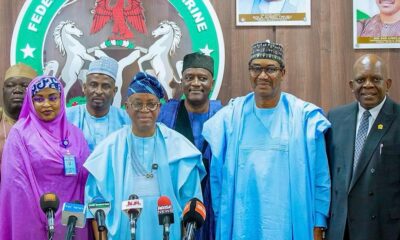
 Customs1 week ago
Customs1 week agoFG Inaugurates Nigerian Shippers’ Council Board, Highlights Need for Reduced Port Costs, Fair Pricing.
-
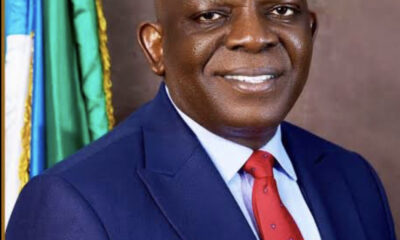
 Maritime Agencies1 week ago
Maritime Agencies1 week agoSuspend Charges Review, Engage Stakeholders, Shippers’ Council Tasks Shipping Companies
-
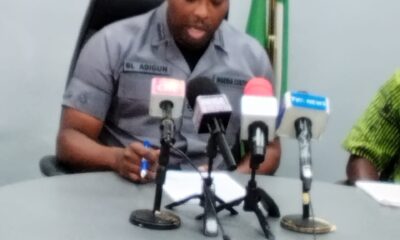
 Customs5 days ago
Customs5 days agoKLT Customs Surpasses 2025 Revenue Target By a Wide Margin, Clamps Down on Expired Imports.
-

 Maritime Agencies4 days ago
Maritime Agencies4 days agoOGUN AREA 1 CUSTOMS: Suspected Armed Drug Traffickers Mount Barricades, Attack Officers. Two Personnel Critically Injured.
-
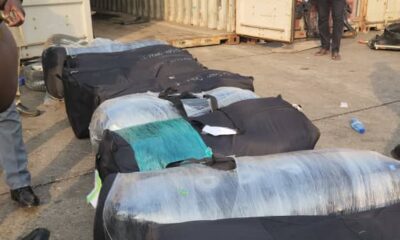
 Maritime Agencies1 day ago
Maritime Agencies1 day agoWAR AGAINST KILLER DRUGS: Apapa Customs, NDLEA Collaborate To Nab Huge Quantity of ‘Canadian Loud’.
-
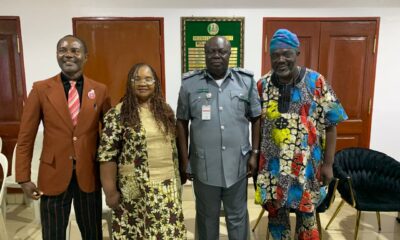
 Maritime Agencies2 days ago
Maritime Agencies2 days agoSeme Customs Raids Hideouts, Impounds 200 Bags of Smuggled Rice, Collects N2bn 3 Weeks into 2026.
-
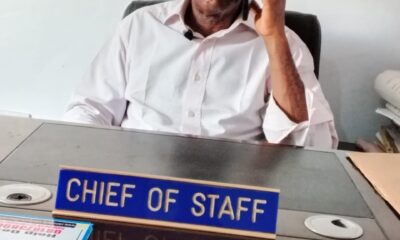
 Maritime Agencies1 day ago
Maritime Agencies1 day agoNAGAFF Compliance Team Set to Relaunch for Stronger Engagement, Enforcement.

























